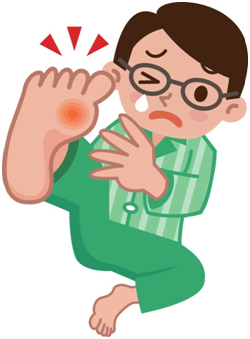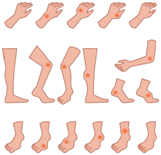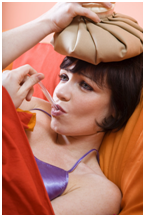| |
Oral Antigout Drugs
|
 |
Gout
|
Gout is a type of arthritis where uric acid crystals (monosodium urate) deposit inside and around joints. It is caused by an uncontrolled metabolic disorder, resulting in too much uric acid in the blood (hyperuricemia). Uric acid is a metabolic waste made from metabolism of purines (found in many foods and in human tissue) and excreted mainly via the kidneys. If overproduction or underexcretion of uric acid occurs, the uric acid crystals may build up and deposit inside and around joints, causing gout attacks. However, hyperuricemia is not the same as gout, asymptomatic hyperuricemia does not need any treatment.
|
The most common symptom is sudden and severe pain in the joints, along with swelling and redness. The large joint of big toe is typically affected, although gout could affect almost any joints and can occur in more than one joint concurrently. The joints towards the ends of the limbs seem to be affected more often, which include the midfoot (the area where your shoelaces would sit), ankles, knees, fingers, elbows and wrists.
Men are more likely to develop gout than women, because female reproductive hormone could reduce the level of uric acid by increase the excretion of uric acid via the kidneys. Moreover, older adults, people who drink too much alcohol or eat food which are rich is purine (e.g. offal, shellfish, liver, seafood), and those who have high blood pressure, diabetes, kidney disease or take diuretics are prone to have gout.
|

|
|
|
▲ back to top
Classes of Antigout Drugs |
Gout is extremely painful, but it is treatable. Oral antigout drugs are the common and effective way for treating and preventing gout attacks. All the registered antigout drugs in Hong Kong are available in oral dosage forms e.g. tablets, capsules, some of them are also available in injectable forms. Most of these products are prescription-only medicines, while a few of them are pharmacy only medicines (e.g. ibuprofen and allopurinol) and over the counter medicines (e.g. probenecid), however, all of them should be administered strictly under doctor’s instruction and recommendation.
Oral antigout drugs can be classified into two categories: drugs to relieve symptoms of gout attacks and drugs to prevent future gout attacks.
|
Drugs to relieve symptoms of gout attacks:
- Non-steroidal anti-inflammatory drugs (NSAIDs): a type of painkiller that can control inflammation and pain in gout attacks. Examples include ibuprofen, naproxen, diclofenac and indomethacin.
For more information on NSAIDs, please refer to http://www.drugoffice.gov.hk/eps/do/en/consumer/news_informations/dm_03.html
- Colchicine: may be used if you are unable to take NSAIDs or if NSAIDs are ineffective. It is not a painkiller, but works by reducing the ability of the uric acid crystals to inflame the joint lining, which reduces some of the inflammation and pain associated with a gout attack.
- Corticosteroids: a type of steroid used to treat severe cases of gout. It controls gout inflammation and pain. It should be used for people who do not respond to other treatment or can't take either NSAIDs or colchicine. Examples include prednisone and prednisolone.
For more information on oral corticosteroids, please refer to http://www.drugoffice.gov.hk/eps/do/en/consumer/news_informations/dm_02.html
Drugs to prevent future gout attacks:
- Xanthine oxidase inhibitors: reduce the production of uric acid by inhibiting an enzyme called xanthine oxidase, which is responsible for converting purines into uric acid. Examples include allopurinol and febuxostat.
- Uricosuric agents: increase the elimination of uric acid by the kidneys, thus lowering the uric acid levels. They are less commonly used because of side effects. Examples include probenecid and benzbromarone.
|
|
|
|
▲ back to top
Common side effects and precautions
Antigout drugs
|
Common side effects
|
Precautions
|
Drugs to prevent future gout attacks |
| 1. | NSAIDs (e.g. ibuprofen, naproxen, diclofenac) |
|
- Nausea
- Vomiting
- Diarrhea
- Constipation
- Decreased appetite
- Fluid retention
- Gastro-intestinal (GI) disturbance
- Hypersensitivity reactions
- Headache
- Dizziness
|
- Should be used with caution in the elderly, women who are breast-feeding, patient with cardiac impairment, asthma, hepatic or renal impairment and coagulation defect
- Should not be used in patient with a history of hypersensitivity to aspirin or any other NSAID, active gastro-intestinal ulceration or bleeding and severe heart failure
- Should not be used in women who are pregnant
- Long term use of some NSAIDs (e.g. diclofenac) may be associated with reduced female fertility, which is reversible on stopping treatment
- Should be taken with milk or food, or using enteric-coated formulations
- Proton pump inhibitor may reduce the risk of NSAID causing GI side effects
|
| 2. Colchicine |
- Nausea
- Vomiting
- Diarrhea
- Abdominal pain
- Rash
|
- Should be used with caution in elderly, in patient with cardiac, hepatic, renal, or gastrointestinal disease and women who are breast-feeding
- Should not be used in patient with blood disorders
- Should not be used in women who are pregnant
- Overdosage may be serious because of narrow therapeutic margin
- Should be withdrawn immediately if myoneuropathy or rhabdomyolysis occur, patients with reduced renal function are at special risk
|
| 3. | Corticosteroids (e.g. prednisone and prednisolone) |
|
- Weight gain
- Thinning bones
- Poor wound healing
- Increased vulnerability to infection
- Thinning of the skin
- Muscle weakness
- Rapid mood swings
|
- Should be used with caution in elderly, in patient with heart failure, recent myocardial infarction, hypertension, diabetes mellitus, epilepsy, glaucoma, hypothyroidism, hepatic failure, osteoporosis, peptic ulceration, psychoses or severe affective disorders, and renal impairment
- Should not be used in patient with acute infections uncontrolled by appropriate antimicrobial therapy and active quiescent tuberculosis
- Abrupt withdrawal after consuming corticosteroid for a prolonged period may lead to serious or fatal complications due to acute adrenal insufficiency
- Risk of chickenpox and severe herpes zoster are increased in non-immune patients receiving therapeutic doses of systemic corticosteroids
- Patients should be examined regularly (e.g. fluid intake and output, weight, back pain) during prolonged courses of corticosteroid therapy
|
Drugs to prevent future gout attacks |
| 4. | Xanthine oxidase inhibitors (e.g. allopurinol and febuxostat) |
|
- Rash
- Gastro-intestinal disturbance
- Headache
- Diarrhoea
- Dizziness
- Malaise
- Reduced liver function (for febuxostat which is metabolised by the liver)
|
- Should not be started during an acute attack
- Initiation of treatment may precipitate an acute attack
- Administer prophylactic NSAID (not aspirin or salicylates) or colchicine as directed by doctor after hyperuricaemia corrected
- Treatment should continue at the same dosage if an acute attack develops
- Dosage should be reduced in renal or hepatic impairment
- Should be withdrawn immediately if a rash occurs, because it may indicate rare but severe hypersensitivity reactions e.g. exfoliative rashes, the Stevens-Johnson syndrome, and toxic epidermal necrolysis (patients with renal or hepatic impairment are at special risk)
- Adequate fluid intake (2–3 litres/day) is necessary(for allopurinol which is metabolised by the kidney)
- Should not be used in patients with ischaemic heart disease or congestive heart failure (for febuxostat)
|
| 5. | Uricosuric agents (e.g. probenecid and benzbromarone) |
|
- Gastro-intestinal disturbance
- Diarrhoea
- Nausea and vomitting
- Headache
|
- Should not be started during an acute attack
- Initiation of treatment may precipitate an acute attack
- Administer prophylactic NSAID (not aspirin or salicylates) or colchicine as directed by doctor after hyperuricaemia corrected
- Treatment should continue at the same dosage if an acute attack develops
- Adequate fluid intake (2–3 litres/day) is necessary
- Should not be used in patients with a history of uric acid renal calculi
- Should be used with caution in patients with a history of peptic ulceration and G6PD deficiency (for probencid)
- Hepatotoxicity can be serious, thus monitoring of liver function periodically is required (for benzbromarone)
|
|
|
▲ back to top
General advice
|
- Rest and raise your limb during a gout attack, don’t knock the affected joint.
- Ice pack may be applied to your affected joint for not more than 20 minutes.
- Gout cannot be cured. But gout attack could be prevented by taking any prescribed drugs as directed and making any recommended lifestyle changes.
- Be familiar with the name and dosage of the medicines you are taking. Be cautious of their possible side effects.
- Avoid purine-rich food, including offal (such as liver, kidney, heart), seafood (such as mussels, scallop, crab, shrimp, other shellfish and sardine), excessive red meat, beans, mushrooms, cauliflower, spinach and asparagus.
- Avoid food with high fat or salt.
- Avoid alcohol and sugar sweetened soft drinks.
- Avoid being overweight and have regular exercise.
|
 |
|
|
|
▲ back to top
Communication with your doctor
|
|
- Consult your doctor if you experience sudden and intense joint pain.
- Seek medical advice immediately if you have fever and your joint is hot and inflamed. You may have an infection inside the joint.
- Communicate with your doctor for the best treatment option. Your doctor will prescribe the most appropriate drugs for you after considering your condition and your response to the drugs.
- Antigout drugs can interact with other medicines. Inform your doctor of the medicines you are taking, including over-the-counter medicines, so they can decide whether an antigout medicine is safe for you to take.
- Certain foods have potential to lower uric acid levels, including coffee, vitamin C-rich food (e.g. orange) and cherries. Consult your doctor if you are suitable to consume these foods.
- Inform your doctor of your medical history, as some diseases may warrant special precautionary measures.
- Inform your doctor that you are pregnant or breast feeding as some of the oral antigout drugs should not be taken by women who are pregnant or breast feeding.
- Seek medical advice immediately if you experience any symptoms or side effects suspected to be related to antigout drugs. Your doctor may review your type of medication.
- Have regular medical follow-up as advised by your doctor.
|
 |
|
|
|
▲ back to top
Storage of Oral Antigout Drugs
Oral antigout drugs should be kept in a cool and dry place. Unless specified on the label, medicines should not be stored in refrigerators. Furthermore, drugs should be kept properly in places unreachable by children to prevent accidental ingestion.
|
|
▲ back to top
|
|
Acknowledgement: The Drug Office would like to thank the Professional Development and Quality Assurance (PD&QA) for their valuable contribution to the preparation of this article.
|
|
|
|
|


